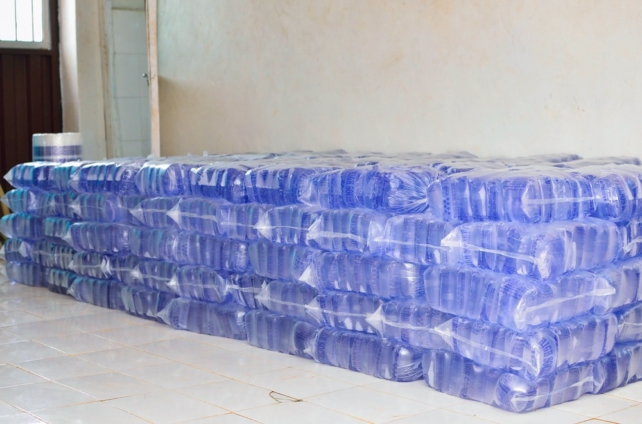Ghana’s Food and Drugs Authority (FDA) has debunked claims that sachet water on the market is contaminated with faecal matter.
The Authority said the outcome of its regular surveillance of sachet water producers is not in conformity with observations by the Ghana Statistical Service.
A study by the Ghana Statistical Service revealed that most sachet water on the market was contaminated with faecal matter.
The multiple indicator cluster survey conducted in 2017 revealed 34.1% of households in Ghana which relied on sachet water as a drinking water source had an appreciable amount of Esherichia coli, a contamination indicator.
In a response to media reports on the poor quality and safety of sachet water, the FDA assured of regular inspection of manufacturing facilities premised on the Authority’s guidelines.
The Authority said it inspects packaging materials to ensure they meet their respective standards.
They inspection includes E. coli, total coliforms, aerobic plate count, Pseudomonas aeruginosa, Streptococcus faecalis and Clostridium perfringens.
The FDA stressed that its laboratory facilities conduct periodic water safety tests and product quality analyses on packaged water on the market.
The statement signed by the Chief Executive Officer of the FDA said “the Authority wants to remind the public of its responsibility to protect consumers, as mandated by the Public Health Act, 2012 (ACT 851). With regard to packaged water (bottled and sachet), the FDA ensures this through the licensing of the manufacturing premises and the registration of these products. The inspection covers the starting material (water) to packaging materials to ensure they meet their respective Ghana standards: and the finished products to meet the requirements of GS175-1:2002 (for drinking water) and GS220:2014 (for mineral water). All inspections are done in accordance with the current Codes of Good Manufacturing Practices (GMP) where end products are released in accordance with the above-stated specifications”.
"The FDA also ensures producers comply with the production process which includes Filtration/Reverse Osmosis which rids water sources of extraneous material, and UV sterilization for destroying deadly disease-causing microorganisms," the regulatory body said.
The Authority is however urging the public to patronize only registered sachet and bottled water manufactured in Ghana.
The public is also admonished to report any unregistered sachet and bottled water at any of its nearest offices across the country.
“The public is strongly advised to patronize only registered sachets and bottled water manufactured in Ghana that bear the FDA product registration numbers,” the statement read.
Latest Stories
-
Prof. Nana Aba Appiah Amfo re-appointed as Vice-Chancellor of the University of Ghana
6 minutes -
German police probe market attack security and warnings
6 minutes -
Grief and anger in Magdeburg after Christmas market attack
7 minutes -
Baltasar Coin becomes first Ghanaian meme coin to hit DEX Screener at $100K market cap
57 minutes -
EC blames re-collation of disputed results on widespread lawlessness by party supporters
1 hour -
Top 20 Ghanaian songs released in 2024
2 hours -
Beating Messi’s Inter Miami to MLS Cup feels amazing – Joseph Paintsil
2 hours -
NDC administration will reverse all ‘last-minute’ gov’t employee promotions – Asiedu Nketiah
2 hours -
Kudus sights ‘authority and kingship’ for elephant stool celebration
2 hours -
We’ll embrace cutting-edge technologies to address emerging healthcare needs – Prof. Antwi-Kusi
3 hours -
Nana Aba Anamoah, Cwesi Oteng special guests for Philip Nai and Friends’ charity event
3 hours -
Environmental protection officers receive training on how to tackle climate change
3 hours -
CLOGSAG vows to resist partisan appointments in Civil, Local Government Service
4 hours -
Peasant Farmers Association welcomes Mahama’s move to rename Agric Ministry
4 hours -
NDC grateful to chiefs, people of Bono Region -Asiedu Nketia
4 hours

